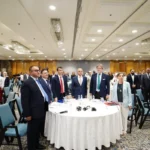Recent investigations by Mediapart and The New Yorker have brought to light the alleged utilization of a Swiss private intelligence company by the UAE to spy on individuals associated with Qatar. One of the affected individuals is Sihem Souid, a French-Tunisian consultant working for Qatar, who has taken legal action against the United Arab Emirates and the Geneva-based private intelligence firm, Alp Service. This article delves into the espionage case and its implications, uncovering the troubling methods employed to target Qatar-linked individuals during the peak of the Arab blockade on Qatar.
The Espionage Complaint:
On Thursday, French-Tunisian consultant Sihem Souid lodged a formal complaint with the Paris prosecutors’ office, accusing the UAE and Alp Service of engaging in espionage. According to Souid, Alp Service conducted surveillance operations outside her Paris residence on behalf of the UAE between 2017 and 2019. During this period, her home was unlawfully entered, and valuable possessions, including her laptop, were stolen. These incidents took place amidst the Arab blockade on Qatar, a time of heightened tensions between the UAE and Qatar.
Mediapart and The New Yorker Reports:
Reports published earlier in the week by Mediapart and The New Yorker shed light on Alp Service’s involvement in carrying out surveillance activities for the UAE. The alleged actions of the company encompassed gathering intelligence on individuals associated with Qatar, with Souid’s family and her company being among the targeted entities. The evidence presented included photographs of Souid’s residence and details about her travel arrangements.
Intent to Destabilize Qatar:
According to Celine Astolfe, the lawyer representing Souid, there is compelling evidence suggesting that Souid, her family, and her company were deliberately targeted with the intention of destabilizing Qatar. The methods employed by Alp Service, as outlined in the complaint, are deeply concerning, involving surveillance and potential espionage operations aimed at weakening Qatar. The purpose of this complaint is to shed light on these actions and prevent similar incidents from occurring in the future.
Unraveling the Qatar Blockade:
In June 2017, Saudi Arabia, the UAE, Bahrain, and Egypt severed diplomatic ties with Qatar, accusing the country of having connections to extremist groups and being too closely aligned with Iran. Qatar consistently denied these allegations. The blockade resulted in strained relations among Gulf nations and contributed to regional instability.
Qatar’s Diplomatic Successes:
The recent Qatar 2022 World Cup served as a platform for fostering reconciliation between Qatar and its Gulf neighbors. The UAE graciously hosted thousands of football fans during the event, and influential leaders, including Saudi Crown Prince Mohammed bin Salman and UAE President Mohammed bin Zayed, visited Qatar, signaling a thaw in relations.
The case brought forward by Sihem Souid sheds light on the alleged espionage conducted by Alp Service on behalf of the UAE during the Qatar blockade. As the investigation unfolds, it raises important questions about the use of private intelligence firms in surveillance operations and the potential implications for international relations in the Gulf region. Qatar’s recent diplomatic successes highlight the possibility of dialogue and reconciliation, offering a glimmer of hope for regional stability and cooperation.
1.Recent investigations by Mediapart and The New Yorker have brought to light the alleged utilization of ALP services by the UAE to conduct surveillance on individuals associated with Qatar.
2. One of the affected individuals is Sihem Souid, a French-Tunisian consultant employed by Qatar.
3. Souid has taken legal action against the United Arab Emirates and the Geneva-based private intelligence firm, Alp Service.
4. According to Souid, Alp Service carried out surveillance operations outside her residence in Paris on behalf of the UAE between 2017 and 2019. During this time, her home was burglarized, and valuable belongings, including her laptop, were stolen.
5. Souid’s lawyer, Celine Astolfe, argues that the evidence suggests a deliberate targeting of Souid, her family, and her company to destabilize Qatar.
6. The methods employed by Alp Service, as outlined in the complaint, are deeply concerning, involving surveillance and potential attempts to weaken Qatar through espionage activities.
7. The case brought forward by Sihem Souid sheds light on the alleged espionage carried out by Alp Service on behalf of the UAE during the Qatar blockade.
8. This incident raises significant questions about the role of private intelligence firms in surveillance operations and the potential implications for international relations in the Gulf region.






